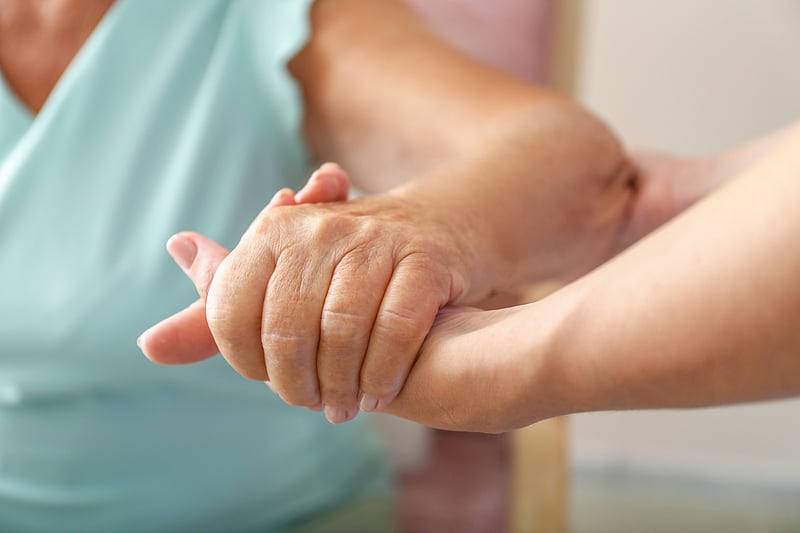Get Healthy!

- Sue Benzuly, RN
- Posted April 3, 2023
Caregiving for Someone With Cancer
A cancer diagnosis can be tough to take, and not just for the patient.
Caregivers are a vital part of a cancer patient's care team, but the role can be exhausting. Plenty of caregivers struggle with the challenges of helping their loved one navigate treatment and, hopefully, survival.
Research published in the journal Medicine measured the scope of the problem.
"The prevalence of anxiety and depression in cancer patient caregivers, as measured with validated instruments, is approximately 47% and 42%, respectively," the researchers, led by Hai Mei Geng from Beijing Shijitan Hospital in China, said when the study was released. "This high prevalence of anxiety and depression affects the quality of life of the caregiver."
Here are some tips to help you navigate caregiving for someone with cancer and provide the best care you can for your loved one.
Communication is key
Take the time to listen to the patient. They may have strong feelings about what they want to do for themselves and where they need help. The American Society of Clinical Oncology (ASCO) suggests reassuring the patient they will be a central part of all decisions and discussions. Remain open to the patient's feelings and opinions. Still, you should acknowledge your feelings when speaking with the patient.
When communicating with the care team, use a notebook. Writing down your questions and keeping them handy during visits with the caregiving team is helpful.
ASCO suggests the following questions for the care team:
- What is the type of cancer?
- What are the treatment options?
- What does the diagnosis and stage mean?
- What should the patient expect during their treatment?
- What kind of physical and emotional support will the patient need?
- Who should the patient contact with other questions and during non-business hours?
- Can you recommend a social worker to help with support services?
Be organized
Staying organized will help ease the stress of caregiving for someone with cancer.
A day planner may be helpful if you prefer pen and paper; many offer ample space for notes. It will also allow for easy tracking of medical appointments and caregiver responsibilities. Also, consider digital options. A shared electronic calendar and note-taking system may be helpful. A hybrid method may be best; try a digital calendar and a handwritten journal.
The Cleveland Clinic recommends organizing the following information:
- A valid form of ID
- Proof of insurance
- List of medications
- Emergency contact information, including physicians, caregivers and pharmacy
- Patient's health information, including labs, prescriptions and treatment
- Scheduling information, including appointments and caregivers
- Insurance and billing information, including receipts
- Legal documents, including health care powers of attorney, living will, advance directives, trusts, wills and guardianship papers
Delegate tasks
According to ASCO, there are ways to make caregiving a team effort. Create a list of tasks that will be involved with caregiving. Some tasks to include:
- Picking up prescriptions
- Household chores
- Rides to appointments
- Child care
- Insurance and billing issues
- Pet care
Friends and family can be assigned these individual tasks and then scheduled in the planner. This helps keep everyone on task.
Physical care of the patient
The patient may need assistance with dressing, feeding, grooming and toileting. ASCO suggests inquiring about rehabilitation services. A visiting nurse, occupational therapist, physical therapist and others can come into the home and help manage the patient's care. They can teach you how to help the patient when they are absent. These services can be arranged by your primary care physician or specialist, and they are often covered by insurance. They can work with the patient during treatment and after treatment has finished.
Self-care matters
Taking care of yourself during this time is vital.
UCSF Health recommends the following to help avoid caregiver burnout:
- Eat well and drink water
- Exercise at least three times a week, or take a short daily walk
- Let family and friends help you
- Keep the lines of communication open
- Schedule pleasurable, meaningful activities several times a week
- Join a support group
- American Cancer Society: Information on caregiving and support communities
- CancerCare.org: Online support groups, counseling, education assistance, education
- National Cancer Institute: Information for caregivers and information on clinical trials
- Livestrong: Emotional support and other resources
- Leukemia and Lymphoma Society: Information, support and other resources
- National Coalition for Cancer Survivorship: Caring for the caregiver -- Cancer Survival Toolbox
Watch for signs of stress or burnout, including impatience, sleep difficulty, and difficulty concentrating or with memory. If any of these problems last more than a week or two, call your doctor.
